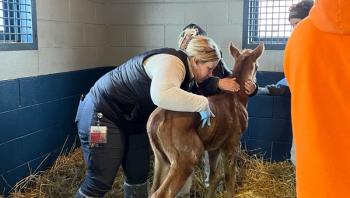
OKVMA sponsors state tax refund check-off system
The Oklahoma Veterinary Medical Association (OKV-MA) is backing an effort to cash in on income tax refunds.
The Oklahoma Veterinary Medical Association (OKV-MA) is backing an effort to cash in on income tax refunds.
The checkoff system allows for an individual, who would otherwise receive a refund from his or her state income tax filing, to check a box on the tax form indicating all or part of the refund designated for a pet overpopulation fund. The money, which would be collected by the state treasury, would be used for spaying and neutering animals.
"While it's not mandatory, the system is something we're trying to direct our interest in to reduce the amount of euthanasia, dog bites in the state and the number of hit-by-cars," says Dr. Charles Helwig, president of the OKVMA. "That's the way we're approaching overpopulation."
The bill, HB 2557, is sponsored by State Rep. Bill Nations. Should the bill pass, a governor-appointed pet overpopulation authority, comprised of representatives from various veterinary, municipal government and animal welfare and control groups, would regulate the fund. Money generated by the fund would go in part to support veterinarians who participate in spay and neuter programs.
Simple set-up
"It works like a voucher program for individual veterinarians who sign up for the program to spay and neuter animals," Helwig says.
In addition to Oklahoma's check-off system, the bill includes a provision for the introduction of vanity license plates, which say, "Pet overpopulation is a crisis; spay and neuter." Monies raised from the plates also would support the pet overpopulation fund.
A similar ongoing initiative in the state of Colorado is proof the check-off program works. Helwig says Oklahoma patterned its proposed state legislation after Colorado's mechanism, after hearing their story. (At presstime, the state of Maine also was supporting a similar bill to create a spay/neuter donation box on state income tax forms.)
Success story
"It's been extremely successful," says Ralph Johnson, executive director of the Colorado Veterinary Medical Association, of the Colorado program installed three years ago.
Created by the legislature in 2000, in tax year 2001, the first functional year of the program, the pet overpopulation check-off generated in excess of $240,000 in contributions from individual taxpayers.
In tax year 2002, contribution declined to $187,000. However, all state check-off funds with the exception of the Special Olympics fund, declined at the rate of 32 percent due to general economic circumstances; the pet overpopulation fund was down just 23 percent.
"That's the silver lining. We were happy with the performance that year even though all giving to all funds was down," Johnson says. "The message we saw in year '02 was that charitable contributions are affected by general economic conditions. We are still in a stressful economic climate in Colorado."
Johnson, who serves on the pet overpopulation board, says the money has enabled grant funding for community collaborations between veterinarians and animal shelters or humane organizations. In the first year, the program enabled 5,600 spay and neuter surgeries.
What money bought
"We're trying to foster partnerships in communities and the funds go to underserved areas of the state where either economics are challenging or there's inadequate veterinary services available," Johnson says.
An important note is that spay and neuter surgeries are subsidized, not paid in full, Johnson says. Additionally, only owned animals, not shelter animals, are eligible for the procedures.
"It requires that the money be leveraged in the community so that they find additional sources of funding to help pay for procedures," he says.
Pivotal to the program's success, Johnson says, is the support of the veterinary and animal welfare community.
Everybody loves it
"Everybody is behind this program. They realize what it does," he says.
Colorado's animal-friendly climate doesn't hurt the cause either.
"Yes, we've got an animal-friendly state committed to high standards of animal health and welfare. And we had effective mechanisms to create awareness about the availability of this check-off contribution," Johnson says.
In the 2004 legislative session, Colorado officials must re-introduce the pet overpopulation check-off program for an additional three-year reauthorization. New rules stipulate all check-off programs must generate $150,000 annually.
Rule change
"We have met that threshold, because there's great public, legislative and community support. It's a win-win-win program," Johnson says.
Newsletter
From exam room tips to practice management insights, get trusted veterinary news delivered straight to your inbox—subscribe to dvm360.




